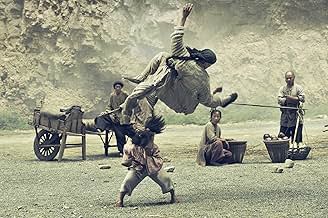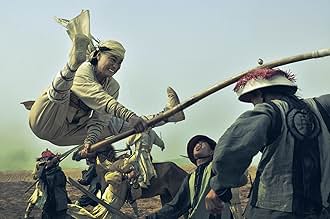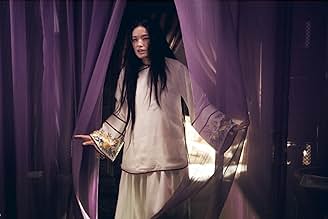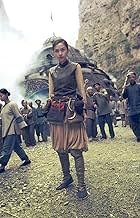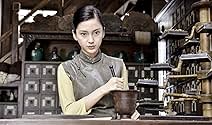VALUTAZIONE IMDb
6,0/10
5360
LA TUA VALUTAZIONE
Aggiungi una trama nella tua linguaYang travels to Chen Village to learn a powerful form of Tai Chi. Though villagers are forbidden from teaching outsiders, Yang becomes their best hope for survival when a man arrives with a ... Leggi tuttoYang travels to Chen Village to learn a powerful form of Tai Chi. Though villagers are forbidden from teaching outsiders, Yang becomes their best hope for survival when a man arrives with a plan to build a railroad through the village.Yang travels to Chen Village to learn a powerful form of Tai Chi. Though villagers are forbidden from teaching outsiders, Yang becomes their best hope for survival when a man arrives with a plan to build a railroad through the village.
- Regia
- Sceneggiatura
- Star
- Premi
- 8 candidature totali
Fung Hak-On
- Lao Zhao
- (as Hark-On Fung)
Xiaochao Yuan
- The Freak
- (as Jayden Yuan)
Eddie Peng
- Fang Zi Jing
- (as Eddie Peng Yu-Yen)
Shaofeng Feng
- Chen Zai Yang
- (as Feng Shao Feng)
Stanley Sui-Fan Fung
- Grand Uncle
- (as Tsui-Fan Fung)
Sicheng Chen
- Chen Geng Yun
- (as Chen Si Cheng)
Xiong Xinxin
- Uncle Qin
- (as Xin Xin Xiong)
Wai Keung Lau
- Father Yang
- (as Andrew Lau Wai Keung)
Recensioni in evidenza
China is changing. Because film is a major force for shaping the national character, among the most interesting things these days, is watching the Chinese scramble to reinvent (post Mao) who they are and how they fit in the modern world.
Their newly-emerging documentary school chronicling the industrial rise of China is one aspect of this, and seems to have produced some pretty good pieces.
Their tried and tested practice though, meant both for internal consumption and abroad, is manufactured postcards of harmony (moral, spiritual), usually anchored in fabled history, usually in martial arts.
We saw that with the faddish promotion of qigong in the 90's, the Wong Fei Hung films and Zhang's Hero. We saw it again a few years ago with Yip Man. This juvenile mishmash is a tai chi showreel for the twitter generation reared on blockbuster steroids.
It is another 'origins' story of martial arts, that of Yang-style taijichuan. And because the filmmaker probably felt that to his teenage audience the mid-1800's would seem like forever ago, he goes crazy on myth and movie nonsense, but careful not to upset state officials.
This leads to a pretty boneheaded product. Once more, Chinese 'purity' is contrasted with encroaching Western civilization. Westerners standing in for capitalism and technology are portrayed as evil and corrupting, while the actual film is made by copying what is currently trending in the capitalist blockbuster market.
The steampunk revisionism of a huge metallic beast threatening the old way of life is from Wild Wild West. The notion of a small community where everyone is a martial arts expert is from Kung Fu Hustle (and of course the story of Chen Jia Gou). The obvious video game humor is from Scott Pilgrim. The wire-fu is Sammo Hung's and a longtime staple of cinematic wushu via HK. The speed-ramps of the opening battle are from 300, with other perspectives borrowed from Scott and recent John Woo.
This is all echoed inside the film as the young boxer learning taijichuan by imitating the moves.
As someone who practices in the Yang-style, I advise you to steer clear of this. It has no sincerity or soul. What is of some interest, is noting the irony of this film in the current climate of aggressively expansive Chinese capitalism. Or how the Kung Fu Panda franchise is widely celebrated there.
Meanwhile, Chinese martial arts have gone from their original mix and match roots of outlaw boxing, to collective standardization in the communist years, to government-promoted sport, to exhibition and health therapy. Having proved inadequate in the modern mixed martial arts world, the current move is away from the forced harmony of (usually fabricated) tradition and towards the practical cross-training system of sanda/sanshou, which in turn emulates several foreign styles.
Their newly-emerging documentary school chronicling the industrial rise of China is one aspect of this, and seems to have produced some pretty good pieces.
Their tried and tested practice though, meant both for internal consumption and abroad, is manufactured postcards of harmony (moral, spiritual), usually anchored in fabled history, usually in martial arts.
We saw that with the faddish promotion of qigong in the 90's, the Wong Fei Hung films and Zhang's Hero. We saw it again a few years ago with Yip Man. This juvenile mishmash is a tai chi showreel for the twitter generation reared on blockbuster steroids.
It is another 'origins' story of martial arts, that of Yang-style taijichuan. And because the filmmaker probably felt that to his teenage audience the mid-1800's would seem like forever ago, he goes crazy on myth and movie nonsense, but careful not to upset state officials.
This leads to a pretty boneheaded product. Once more, Chinese 'purity' is contrasted with encroaching Western civilization. Westerners standing in for capitalism and technology are portrayed as evil and corrupting, while the actual film is made by copying what is currently trending in the capitalist blockbuster market.
The steampunk revisionism of a huge metallic beast threatening the old way of life is from Wild Wild West. The notion of a small community where everyone is a martial arts expert is from Kung Fu Hustle (and of course the story of Chen Jia Gou). The obvious video game humor is from Scott Pilgrim. The wire-fu is Sammo Hung's and a longtime staple of cinematic wushu via HK. The speed-ramps of the opening battle are from 300, with other perspectives borrowed from Scott and recent John Woo.
This is all echoed inside the film as the young boxer learning taijichuan by imitating the moves.
As someone who practices in the Yang-style, I advise you to steer clear of this. It has no sincerity or soul. What is of some interest, is noting the irony of this film in the current climate of aggressively expansive Chinese capitalism. Or how the Kung Fu Panda franchise is widely celebrated there.
Meanwhile, Chinese martial arts have gone from their original mix and match roots of outlaw boxing, to collective standardization in the communist years, to government-promoted sport, to exhibition and health therapy. Having proved inadequate in the modern mixed martial arts world, the current move is away from the forced harmony of (usually fabricated) tradition and towards the practical cross-training system of sanda/sanshou, which in turn emulates several foreign styles.
this movie is another coffin nail of how Chinese movies have already past the point of no return unsalvageable terminal disease. this movie has wasted lot of money on nothing but messy childish soul-less hollow gimmicks. the screenplay was also a milestone of the worst of worst Chinese screenplay writers who got the incurable brain damage from reading too many absurd comic books and playing too many ridiculous video games. viewers who praised this movie as an epic masterpiece should also have their heads thoroughly checked, but i doubt MRI could find how their brains were damaged since those comic books and video games are like untraceable virus. this movie also proved that the failure of the Chinese education system which only created copycatting self-claimed geniuses like guys eating too much American junk food after endless garbage-in, garbage-out digestion. all kinds of crap to these people are like most tasteful cuisines.
oh my god, what a mess of this movie has created. i don't even have appropriate words to describe how disgusting this movie is. i always wonder why those rich people would invest money on such pure garbage. by ridiculing one of the legendary Chinese martial arts masters is on the par of the Chinese communist party who claimed itself was the sole party fighting the Japanese invasion. this movie is so disgusting that i don't even know how to review it with proper words. god forgive me.
oh my god, what a mess of this movie has created. i don't even have appropriate words to describe how disgusting this movie is. i always wonder why those rich people would invest money on such pure garbage. by ridiculing one of the legendary Chinese martial arts masters is on the par of the Chinese communist party who claimed itself was the sole party fighting the Japanese invasion. this movie is so disgusting that i don't even know how to review it with proper words. god forgive me.
A lot goes on in 'Tai Chi Zero' - the first in a planned trilogy that attempts a revisionist take on the classic martial arts movie – but too little of it registers in a memorable way by the time it is over. Inspired by the life of Yang Luchuan – founder of the Yang school of taichi – this kinetic frenzy of a movie sees director Stephen Fung drawing from broad pop culture and cinematic influences to create something fresh, fun and irreverent, though the end result is probably noteworthy only for its ambition.
Barely five minutes into the movie, you get the distinct sense that Fung is trying too hard. Opening with what is supposed to be an epic battle between the Imperial Forces and a band of resistance fighters, we are quickly acquainted with Yang's supposedly superhuman powers that are unleashed whenever someone hits him on a small horn-like bump on the side of his head. Not content to leave it at that, there is an unnecessary flashback that transports us to the day of Yang's birth just to unravel his tragic childhood.
If what was supposed to be poignant turns up less so, it is squarely Fung's fault, employing the silent film treatment complete with a playful score and old-fashioned inter-titles to convey the characters' dialogue over the course of that flashback. That is when you also realise that Fung is serious about greeting all the famous celebs he's managed to get to cameo in his movie, using captions to tell you who and where an actor playing a particular character comes from – including Hong Kong director Andrew Lau of 'Infernal Affairs' as Yang's father and Shu Qi as his mother.
When we return to present time, Yang has blacked out and is advised by a physician (look, there's legendary kungfu actor Leung Siu Hung!) to seek a new form of inner martial arts, as the brute methods he's been learning so far will only drain his physical strength and lead to quick and certain death. So Yang escapes in search of the legendary Chen village, renowned supposedly for its tai chi techniques – though he will have to spend the rest of the first half of the movie convincing the villagers to teach their fiercely guarded moves to an outsider.
There's never any doubt Yang will eventually earn the respect of the villagers, so the first half instead takes a light-hearted tone as Yang faces off against the various village pugilists (one of them played by kungfu veteran Xiong Xin Xin) a la video game style. Amidst the stylised visuals that resemble Edgar Wright's 'Scott Pilgrim Vs. The World' in its pop-art, the film tries to earn some dramatic credit through Yang's unusual tutelage from a solitary labourer (Tony Leung Kar-Fai), as well as the unwelcome arrival of the East India Company on the heels of former village boy Zijing's (Eddie Peng) return.
The former follows the narrative convention of a wise old master teaching a brash young kid, while the latter adopts that of a humble village standing up for itself against the forces of modernisation. Except for the fact that the latter involves a massive steam-run metal machine called 'Troy No 1' that seems ripped from the celluloid of Barry Sonnenfeld's 'Wild Wild West', both stories stick faithfully close to formula, and the emotional beats they are meant to hit seem all too perfunctory to resonate.
Ditto for a subplot that fails miserably at building some sort of love triangle between Zijing, the village beauty Yuniang (Angelababy) and an 'ang-mo' officer Claire (played by some Hong Kong Caucasian model whose name is among the many we cannot remember) – the dialogue between the apparently starstruck Claire and Zijing is so stilted it is guaranteed to make you cringe. Even with a surfeit of visual distractions, it is clear that the plot is one of the movie's weak points.
So too in fact are the stylistic choices that Fung settles for. It's one thing to try to be different and another when you actually succeed – 'Tai Chi 0' unfortunately only manages the former. Indeed, all the elements for a good-ol throwback to the classic martial arts movie are in place – a true to life character, an ensemble of notable kungfu actors, and the evil Western revolution (think 'Once Upon A Time in China' – but Fung overdoes the cheekiness in messing with the form, and all that animation, comic book graphics and on screen captioning just grows tired and tiresome too quickly.
Still, if Fung doesn't have Stephen Chow's wacky sense of humour to make this the next 'Kung Fu Hustle', his love for the martial arts actors of the past is never in doubt. He also does his bit for the kungfu genre by unearthing a new bunch of young actors – including casting a suitably charismatic Yuan Xiaochan in the lead role of Yang Luchuan. With Sammo Hung as action director, you can be sure that the numerous action sequences in the movie do not disappoint – and the ones between Yuan and other true-blue martial arts actors like Xiong Xin Xin are especially thrilling.
Thankfully, most of them do make it alive for the second-parter, which is slated to open just three weeks later. The ending is tantalising to say the least - what with two formidable swordsmen arriving at the gates of the Chen village to challenge Xiong Xin Xin and an army of Western battleships heading towards the Chinese coast loaded with big cannons promising bigger and noisier battles – demonstrating a lot of promise here for a new 'Wong Fei Hung'-type franchise. While we're not objecting to Fung's choice for a playful and inventive take on the kungfu genre, he would do well to pay heed to the oft-told martial arts adage – restraint, and not excess, is what ultimately makes one potent.
Barely five minutes into the movie, you get the distinct sense that Fung is trying too hard. Opening with what is supposed to be an epic battle between the Imperial Forces and a band of resistance fighters, we are quickly acquainted with Yang's supposedly superhuman powers that are unleashed whenever someone hits him on a small horn-like bump on the side of his head. Not content to leave it at that, there is an unnecessary flashback that transports us to the day of Yang's birth just to unravel his tragic childhood.
If what was supposed to be poignant turns up less so, it is squarely Fung's fault, employing the silent film treatment complete with a playful score and old-fashioned inter-titles to convey the characters' dialogue over the course of that flashback. That is when you also realise that Fung is serious about greeting all the famous celebs he's managed to get to cameo in his movie, using captions to tell you who and where an actor playing a particular character comes from – including Hong Kong director Andrew Lau of 'Infernal Affairs' as Yang's father and Shu Qi as his mother.
When we return to present time, Yang has blacked out and is advised by a physician (look, there's legendary kungfu actor Leung Siu Hung!) to seek a new form of inner martial arts, as the brute methods he's been learning so far will only drain his physical strength and lead to quick and certain death. So Yang escapes in search of the legendary Chen village, renowned supposedly for its tai chi techniques – though he will have to spend the rest of the first half of the movie convincing the villagers to teach their fiercely guarded moves to an outsider.
There's never any doubt Yang will eventually earn the respect of the villagers, so the first half instead takes a light-hearted tone as Yang faces off against the various village pugilists (one of them played by kungfu veteran Xiong Xin Xin) a la video game style. Amidst the stylised visuals that resemble Edgar Wright's 'Scott Pilgrim Vs. The World' in its pop-art, the film tries to earn some dramatic credit through Yang's unusual tutelage from a solitary labourer (Tony Leung Kar-Fai), as well as the unwelcome arrival of the East India Company on the heels of former village boy Zijing's (Eddie Peng) return.
The former follows the narrative convention of a wise old master teaching a brash young kid, while the latter adopts that of a humble village standing up for itself against the forces of modernisation. Except for the fact that the latter involves a massive steam-run metal machine called 'Troy No 1' that seems ripped from the celluloid of Barry Sonnenfeld's 'Wild Wild West', both stories stick faithfully close to formula, and the emotional beats they are meant to hit seem all too perfunctory to resonate.
Ditto for a subplot that fails miserably at building some sort of love triangle between Zijing, the village beauty Yuniang (Angelababy) and an 'ang-mo' officer Claire (played by some Hong Kong Caucasian model whose name is among the many we cannot remember) – the dialogue between the apparently starstruck Claire and Zijing is so stilted it is guaranteed to make you cringe. Even with a surfeit of visual distractions, it is clear that the plot is one of the movie's weak points.
So too in fact are the stylistic choices that Fung settles for. It's one thing to try to be different and another when you actually succeed – 'Tai Chi 0' unfortunately only manages the former. Indeed, all the elements for a good-ol throwback to the classic martial arts movie are in place – a true to life character, an ensemble of notable kungfu actors, and the evil Western revolution (think 'Once Upon A Time in China' – but Fung overdoes the cheekiness in messing with the form, and all that animation, comic book graphics and on screen captioning just grows tired and tiresome too quickly.
Still, if Fung doesn't have Stephen Chow's wacky sense of humour to make this the next 'Kung Fu Hustle', his love for the martial arts actors of the past is never in doubt. He also does his bit for the kungfu genre by unearthing a new bunch of young actors – including casting a suitably charismatic Yuan Xiaochan in the lead role of Yang Luchuan. With Sammo Hung as action director, you can be sure that the numerous action sequences in the movie do not disappoint – and the ones between Yuan and other true-blue martial arts actors like Xiong Xin Xin are especially thrilling.
Thankfully, most of them do make it alive for the second-parter, which is slated to open just three weeks later. The ending is tantalising to say the least - what with two formidable swordsmen arriving at the gates of the Chen village to challenge Xiong Xin Xin and an army of Western battleships heading towards the Chinese coast loaded with big cannons promising bigger and noisier battles – demonstrating a lot of promise here for a new 'Wong Fei Hung'-type franchise. While we're not objecting to Fung's choice for a playful and inventive take on the kungfu genre, he would do well to pay heed to the oft-told martial arts adage – restraint, and not excess, is what ultimately makes one potent.
Watching this movie reminded me to Bunraku, or Scott Pilgrim where there are comic elements fused in, but better. After a while I lost interest in watching Bunraku or Scott Pilgrim, they became boring and dull while Tai Chi 0 still has lots of things to offer till the end.
This is the 1st Stephen Fung's movie that I watched and he surely does a good jobs. The fight choreography by Sammo Hung, visual (and comical)& sound effects, scores, some camera works, the acting from Tony Leung and Angelababy (gosh, she's so fresh n pretty) are the good part of this movie.
However, the acting of both leading male and that British woman are wooden, even the village people give better performance. While Angelababy delivers decent acting but her moves as a fighter is not convincing. The pace drags a bit in the middle of the movie, the camera work inside that giant machine are dull/not creative, the story is quite thin - without any elements add in, it may only make half of a movie. I should give '8' to this movie, but considering these lacks, I can only give 6.
Kudos especially to Stephen Fung and Sammo Hung, which from this poor script and resources still can make an enjoyable flick. And I still want to see the sequel "Tai Chi Hero", hopefully it will be better.
This is the 1st Stephen Fung's movie that I watched and he surely does a good jobs. The fight choreography by Sammo Hung, visual (and comical)& sound effects, scores, some camera works, the acting from Tony Leung and Angelababy (gosh, she's so fresh n pretty) are the good part of this movie.
However, the acting of both leading male and that British woman are wooden, even the village people give better performance. While Angelababy delivers decent acting but her moves as a fighter is not convincing. The pace drags a bit in the middle of the movie, the camera work inside that giant machine are dull/not creative, the story is quite thin - without any elements add in, it may only make half of a movie. I should give '8' to this movie, but considering these lacks, I can only give 6.
Kudos especially to Stephen Fung and Sammo Hung, which from this poor script and resources still can make an enjoyable flick. And I still want to see the sequel "Tai Chi Hero", hopefully it will be better.
The boy Yang Lu Chan (Jayden Yuan) was born with a little fleshy horn on his forehead and is called The Freak and is humiliated and rejected by the other boys in his village. However, when the horn is touched, he turns into an eminent kung fu warrior. When his beloved mother dies, he follows his Master Lao Zhao (Hark-On Fung) that is the leader of the Divine Truth army that fights the emperor army. However, every time that Yang fight, his horn gets darker and Master Dong (Siu-Lung Leung) tells that if it gets black, he will die. When the emperor army attacks the Divine Truth, Dong is deadly injured and he advises Yang to travel to the Chen Village to seek out Master Chen Chang Xing (Tony Leung Ka Fai) and learn the martial art Tai Chi that would provide energy to him to survive. However, the Master Chen is in a retreat and the Chen villagers refuse to teach the technique to outsiders. Yang meets Chen's daughter Chen Yu Niang (Angelababy) and she successively beats up on him trying to force Yang to give up. But a laborer suggests Yang to learn the Tai Chi movements while she beats him.
Meanwhile, Yu Niang's former boyfriend Fang Zi Jing (Eddie Peng), who was born in the village but has studied in Europe, returns to Chen Village expecting to convince the locals to allow building a railroad across their land. His proposal is rejected and he returns with the railroad representative Claire Heathrow (Mandy Lieu) in a lethal machine with British soldiers to destroy the Chen Village. Yang believes that if he becomes a hero saving the village, the locals will teach him Tai Chi.
"Tai Chi 0" is a funny adventure that uses the ancient Chinese tradition in the format of a video game. The good thing is that despite the difference of cultures, the story is highly entertaining and is worthwhile watching this movie. The bad thing is that the movie is to be continued. My vote is seven.
Title (Brazil): "O Mestre da Guerra" ("The Master of the War")
Meanwhile, Yu Niang's former boyfriend Fang Zi Jing (Eddie Peng), who was born in the village but has studied in Europe, returns to Chen Village expecting to convince the locals to allow building a railroad across their land. His proposal is rejected and he returns with the railroad representative Claire Heathrow (Mandy Lieu) in a lethal machine with British soldiers to destroy the Chen Village. Yang believes that if he becomes a hero saving the village, the locals will teach him Tai Chi.
"Tai Chi 0" is a funny adventure that uses the ancient Chinese tradition in the format of a video game. The good thing is that despite the difference of cultures, the story is highly entertaining and is worthwhile watching this movie. The bad thing is that the movie is to be continued. My vote is seven.
Title (Brazil): "O Mestre da Guerra" ("The Master of the War")
Lo sapevi?
- ConnessioniFeatured in WatchMojo: Top 10 Best Steam Punk Movies (2017)
- Colonne sonoreSymphony No. 9 in E minor Op. 95 'From the New World'
Written by Antonín Dvorák
Performed by The New World Symphony Orchestra
I più visti
Accedi per valutare e creare un elenco di titoli salvati per ottenere consigli personalizzati
- How long is Tai Chi Zero?Powered by Alexa
Dettagli
Botteghino
- Lordo Stati Uniti e Canada
- 212.094 USD
- Fine settimana di apertura Stati Uniti e Canada
- 85.094 USD
- 21 ott 2012
- Lordo in tutto il mondo
- 1.317.376 USD
- Tempo di esecuzione1 ora 40 minuti
- Colore
- Mix di suoni
- Proporzioni
- 2.35 : 1
Contribuisci a questa pagina
Suggerisci una modifica o aggiungi i contenuti mancanti

Divario superiore
By what name was Tai ji 1: Cong ling kai shi (2012) officially released in Canada in English?
Rispondi


